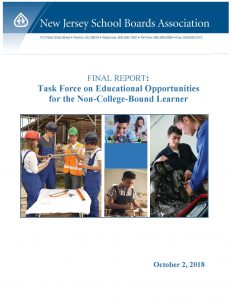Final Report: Educational Opportunities for the Non-College Bound Learner
Ensuring that the career-focused student is prepared for the workforce and post-secondary education

OCTOBER 2018–Approximately one year ago, the New Jersey School Boards Association, under the leadership of President Daniel T. Sinclair, created the Task Force on Educational Opportunities for the Non-College Bound Learner. The project’s ultimate goal: Identify strategies to better equip career-focused students with the skills required in a job market that is rapidly changing due to advances in artificial intelligence, automation, robotics, and other factors.
America has experienced radical changes in employment. There is a disconnect between the skills that are being taught in schools, and the skills required in many entry-level positions. The NJSBA Task Force makes 69 recommendations to address this challenge.
“We owe it to our students to respond to societal change and employment needs.”
FULL REPORT
Download the complete 123-page report
Table of Contents and Cover
Letter of Transmittal
Task Force Charge and Membership
Executive Summary
Findings and selected recommendations
Introduction: Where we are, and how we arrived here
A historical perspective
Student debt
The ‘middle-skills’ gap
CTE education in New Jersey–A history
The current CTE structure
CTE in a comprehensive high school
Colorado CareerWise apprenticeship program
Impact of technology
Chapter 1: Needs, attitudes, expectations
Workforce, society, parents and students
Chapter 2: Communication and collaboration
Employers’ current and future needs
Essential skills
Government support for CTE education in comprehensive high schools
Resolving the tension between county vocational and K-12/regional districts
Chapter 3: Curriculum and school-based programs
Reflecting realities of the economy and job market
Full-range of post-secondary opportunities
Cost of post-secondary education
Chapter 4: Teacher preparedness and certification
Shortage of CTE educators
Certification/endorsement in CTE areas
STEM/STEAM and ‘makerspace’ educators
Conflicts in state regulation
Chapter 5: Student assessment and graduation requirements
Adequacy of state testing program
Measuring achievement: multi-modal assessment
Workforce development boards and high school students
Chapter 6: Financial implications
State, federal and local funding
Inter-district collaboration
Grants and public-private partnerships
Labor-management collaboration
Chapter 7: The Next Steps
Defining roles of vocational districts, comprehensive high schools and colleges
Dual enrollment
Need to review of high school organization and curricula
List of 69 Recommendations
APPENDICIES
I.White Paper: Preparing the Non-College-Bound Student for the Post-Secondary World (NJSBA, June 2018)
II.Apprenticeships: A Key to a “Future Ready” New Jersey (NJSBA, June 2018)
III.County Vocational-Technical School Partnership Grants (New Jersey Council of County Vocational-Technical Schools)
IV.Murphy Administration Announces Vo-Tech Partnership Grants (New Jersey Department of Education, May 2018)
V.Manufacturing-Related Programs in New Jersey Vocational-Technical Schools (NJCCVTS)
VI. Strengthening Career and Technical Education for the 21st Century Act: Major Tenets (Association for Career and Technical Education)